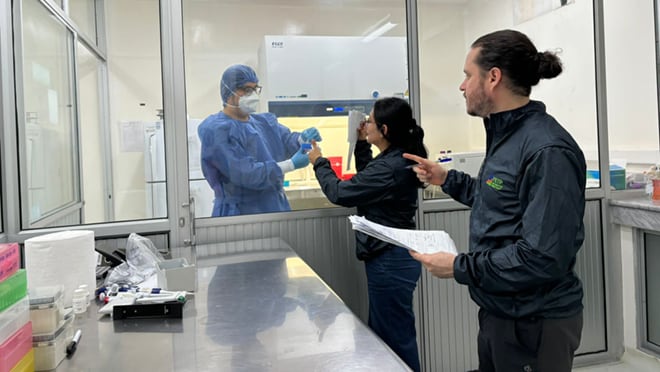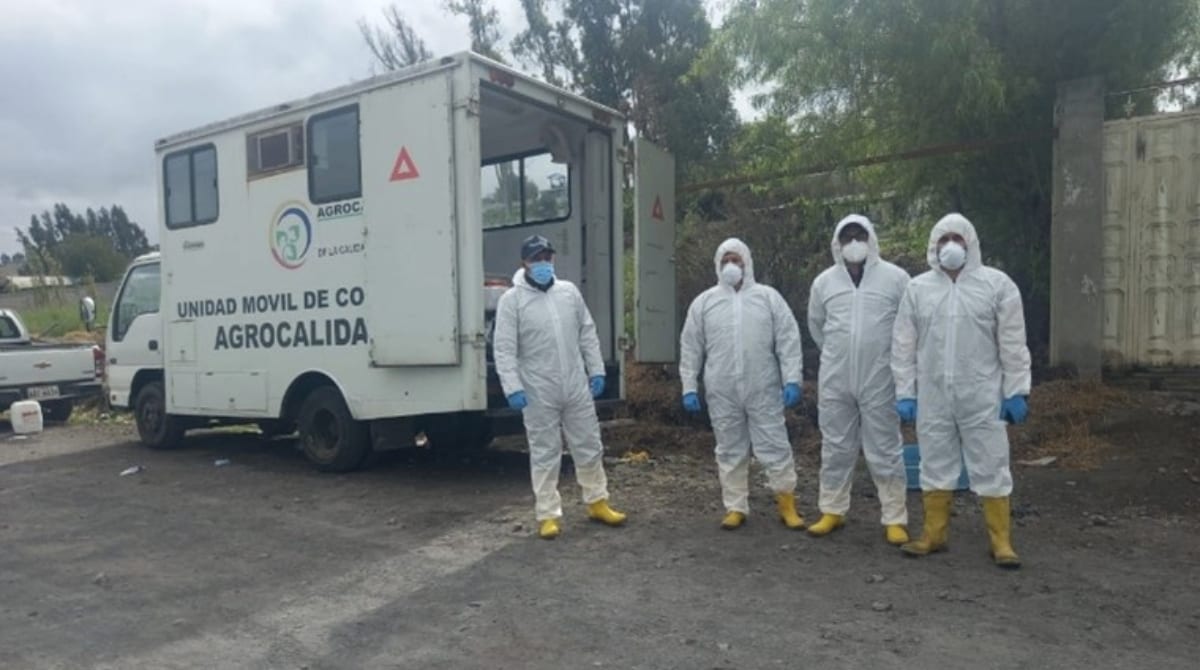At a glance
- In 2023, Ecuador reported its first-ever human case of avian influenza A (H5N1 bird flu).
- Public health professionals in CDC's Field Epidemiology Training Program and the Global Laboratory Leadership Programme played a crucial role in identifying and containing the illness.
- Through rapid response efforts and a One Health approach, the patient's infection was identified, and no further cases were reported.

Challenge
An emerging bird flu threat

In November 2022, the Ecuadorian government declared an animal health emergency after the country detected its first outbreak of H5N1 avian influenza in poultry. Large numbers of commercial and domestic birds—including chickens, ducks, and geese—were already sick or had died from the virus.
Officials rapidly responded to control the outbreak in poultry, such as intensifying surveillance, testing, and monitoring disease trends. However, animal and human health experts shared a major concern—given the close contact between many people with poultry in their yards or workplaces, infection in humans was still possible.
In December, the experts' concerns became reality. A nine-year-old girl in the province of Bolívar developed symptoms of a severe acute respiratory infection, which initially included a runny nose, nausea, and vomiting. With her condition worsening, she was transferred to a pediatric hospital in Quito on January 2, 2023, and subsequently diagnosed with avian influenza. The virus was confirmed by Ecuador's National Institute of Public Health and Research (INSPI) and by CDC's Influenza Division in the United States.
It was the first human case of avian influenza ever detected in Ecuador. Health officials quickly notified the World Health Organization (WHO) as this was a public health emergency.
Approach
Trained professionals at the ready

This first case was rapidly identified thanks to a group of fast-acting Ecuadorian public health professionals trained through two flagship global health security programs.
Staff trained through CDC's FETP-Frontline program were instrumental in confirming the cause of the patient's illness. Since 2017, more than 250 Ecuadorian public health professionals have completed the three-month program, which focuses on surveillance and response to local disease cases or outbreaks. In October 2022, just before the initial bird flu outbreak, Ecuador became one of the first countries to a pilot a new CDC-funded course called "FETP-Frontline One Health."
Around the same time, 23 Ecuadorian trainees were taking part in the Global Laboratory Leadership Programme, which is the first laboratory leadership program to emphasize a One Health approach. This two-year, intensive program strengthens national laboratory system capacity, which helps keep Ecuadorians safe from infectious diseases through rapid detection and response.
Together, these trainings meant that Ecuador had the right people at the right time when bird flu struck.
Impact
As soon as the human case of bird flu was identified, public health and laboratory teams worked together to quickly establish an "epidemiological barrier" in the affected community. They used their skills to conduct contact tracing, and actively searched for additional cases in humans. Public health officials monitored 25 contacts of the first identified index case, including four suspected cases with respiratory symptoms and possible exposure to birds.
Experts from various areas jumped in to further coordinate the response, for example:
- Animal health experts implemented testing and vaccination interventions among commercial and domestic poultry in Bolívar province to identify and control additional cases of avian influenza. By May 2023, they had vaccinated 6.3 million birds in at-risk areas.
- Staff from the Ministry of Public Health and from Agrocalidad launched communication campaigns and made presentations at local fairs. Prevention activities included a national press release, informational leaflets, training sessions for farmers on biosecurity measures, and workshops on good hygiene practices.
- The national vaccination program carried out influenza vaccination campaigns in the human population. In just six days, the campaign reached 100% coverage in the affected locality.
Thanks to efficient disease surveillance systems, astute clinicians, and the rapid action of local and national health officials, Ecuador's first human avian influenza infection was rapidly identified, examined, and treated. The girl recovered, and no one else fell ill with avian influenza.
Looking ahead
The success of this collaborative, multisectoral One Health response was made possible by the strong foundations laid through CDC's training programs: FETP-Frontline One Health and the Global Laboratory Leadership Programme.
Through the South America Regional Office and staff based in Ecuador, CDC continues to strengthen national and regional public health systems by prioritizing workforce development programs such as One Health FETP and the Global Laboratory Leadership Programme. These ongoing efforts help ensure that the region is ready to implement rapidly coordinated responses to infectious disease outbreaks and protect the health of people globally.
